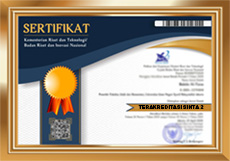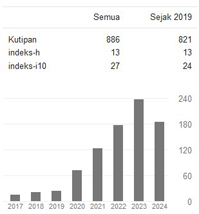Reading Political Integralism Using Eclectic and Dialectic Methods: A Study of Supomo's Reception of Spinoza, Adam Muller, and Hegel
Abstract
Supomo put forward the idea of political integralism (Staatsidee Integralistik), in the Indonesian State Establishment Session (1945), by referring to three Western philosophers: Spinoza, Adam Muller, and Hegel. The question from an academic aspect that has not been answered until now is why integralism must be based on these three philosophers and not others, and also why must it start with Spinoza and end with Hegel and not another arrangement? With this philosophical study method, we want to explore why Supomo mentioned the three philosophers in such an arrangement, was it because of chronological or study method reasons? Therefore, there are two possible answers: First, Supomo took the appropriate elements from each philosopher according to the needs to fill the philosophical substance of his integralistic idea, so it is an eclectic method. Second, considering that the three philosophers cannot simply be connected, let alone equated, and supported by the structure of Supomo's speech which is also dialectical, so he uses the dialectical method. The result of this study is that integralism uses the dialectical method with its central idea of religion: Spinoza (thesis) rejects a religious state; Adam Muller (antithesis) accepts a religious state; and Hegel (synthesis) defines co-existence as both, thus recognizing that religion exists in the state but does not have to be a religious state. Hegel's answer is by the optio fundamentalis of Supomo's politics, namely rejecting the Islamic State demanded by Muslims and wanting to build a nation-state that includes all groups.
Keywords: integralistic state, organic state, dialectic, religious state, nation state
Full Text:
PDFReferences
Balibar, Etienne, “Spinoza: from Individuality to Trans-individuality”, in Medeleingen vanwege het Spinjozahuis, Vol. 71, Delft: Eburon, 1997.
Barbone, Steven, “What Counts as an Individual for Spinoza?”, in Spinoza: Metaphysical Themes. Olli I. Koistinen and John I. Biro (eds.). New York: Oxford University Press, 2001: 89-112.
Baturschat, Wolfgang, “The Ontological Basis of Spinoza’s Theory of Politics”, in Spinoza’s Political and Theological Thought. C. De Deugh (ed.). Amsterdam: North-Holland Publishing, 1984, 30-36.
Bloom, Hans, “Spinoza on Res Publica, Republics and Monarchies”, in Monarchism in the Age of Enlightenment: Liberty, Patriotism, and the Public Good. Hans Bloom, John Christian Laursen, and Luisa Simonutti (eds.). Toronto: University of Toronto Press, 2007: 19-44.
Bourchier, David, Pancasila Versi Orde Baru dan Asal Muasal Negara Organis (Integralistik) (The New Order Version of Pancasila and the Origins of the Organic (Integralistic) State), Yogyakarta: Aditya Media, 2007.
Della Rocca, Michael, “Spinoza’s Substance Monism”, in Olli Koistinen & John Biro (ed.), Spinoza: Metaphysical Themes. New York: Oxford, 2022: 11-37.
Eckstein, Walter, “Rousseau and Spinoza: Their Political Theories and Their Conception of Ethical Freedom”, dalam Journal of the History of Ideas, 5 (3), 1944: 259-291.
Deleuze, Gilles, Spinoza. Filsafat Praktis (Spinoza. Practical Philosophy) (trans. Fandy Hutari), Yogyakarta: Barbasari, 2018.
Geertz, Clifford, The Religion of Java, New York: The Free Press, 1969.
Hegel, W.G.F, Grundlinien der Philosophie des Rechts oder Naturrechts und Staatswissenschaft im Grundrisse, Hegel Studien Ausgabe, Jilid 2, Frankfurt: Fischer Bucherei, 1968.
Hegel, W.G.F, Wissenschaft der Logik, Jilid 2, (ed. Geog Lasson), Leipzig: Felix Meiner, 1951.
Hegel, W.G.F., Enzyklopedie der philosophischen Wissenschaften im Grundrisse (1830), (Ed. Friedhelm Nicolin und Ott Poggeler), Hamburg: Felix Meiner Verlag.
Heinzmann, Richard, Thomas von Aquin, Stuttgar Berlin Kohln: Kohlhammer, 1994.
Hutagalung, Daniel, “Menapaki Jejak-jejak Pemikiran Supomo Mengenai Negara Indonesia” (Following in the footsteps of Supomo's thoughts regarding the Indonesian stat) dalam JENTERA, Jurnal Hukum, Vol. 3, Oktober, 2005.
Jegalus, Norbertus. “Das Integralistische Staatsverstandnis nach Adam Muller (1779-1829) und seine Rezeption in Indonesien. Zur Debatte um die Gestalt des Indonesischen Staates und die Interpretation der Pancasila-Doktrin,” Thesis, Hochschule fur Philosophie, Philosophische Fakultat S.J. Munchen, 2000.
Jegalus, Norbertus, Das Verhaltnis von Politik, Religion und Zivilreligion, untersuct am Beispiel der Pancasila. Munchen: Herbert Utz Verlag, 2009.
Jegalus, Norbertus, “Modernizing Religion and Culture: Sutan Takdir Alisjahbana’s Philosophical Perspective of Values”, in Indonesia Journal of Interdisciplinary Isl Magnis-Suseno, Franz, Etika Politik. Prinsip-prinsip Moral Dasar Kenegaraan Modern, Jakarta: Gramedia Pustaka Utama, 1999.
Jegalus, Norbertus, “Tractatus Politicus dan Demokrasi: Risalah Model-model Rezim yang Rasional”, in Ledalerro, Vol. 22, No. 2. December 2023. http://dx.doi.org/10.31385/jl.v22i2.379.102-119.
Magnis-Suseno, Franz, Filsafat sebagai Ilmu Kritis (Philosophy as Critical Science), Yogyakarta: Kanisius, 1992.
Magnis-Suseno, Franz, Pijar-pijar Filsafat. Dari Gatholoco ke Filsafat Perempuan, dari Adam Muller ke Postmodernisme (The Afterglow of Philosophy. From Gatholoco to Women's Philosophy, from Adam Muller to Postmodernism), Yogyakarta: Kanisius, 2005.
Magnis-Suseno, Franz, 13 Model Pendekatan Etika. Bunga Rampai Teks-teks Etika dari Plato sampai dengan Nietzsche (13 Models of Ethical Approaches. An Anthology of Ethics Texts from Plato to Nietzsche), Yogyakarta: Kanisius, 1998.
Malcolm, Noel. “Hobbes and Spinoza”, in The Cambridge History of Political Thought 1450-1700. J. H. Burns (ed.). Cambridge: Cambridge University Press, 1991: 530-560.
Melamed, Yitzhak. “Spinoza’s Metaphysics of Substance. The Substance-Mode Relation as a Relation of Inherence and Predication”, in Philosophy and Phenomenological Research, 1: 2009: 17-82.
Muller, Adam, Die Elemente der Staatskunst, I dan II, (ed. Jakob Baxa), Jena: Gustav Fischer, 1922.
Muller, Adam, Ausgewahlte Schriften zur Staatsphilosophie, (ed. Rudolf Kohler), Munchen: Theatiner Verlag, 1923.
Muller, Adam, Von der Notwndigkeit einer theologischer Grundlage des gesamten Staatswissenscahften und der Staatswirtschaft insbesondere” (Ed. Albert Josef Klein), Jena: 1982. dan
Muller, Adam, Die innere Staatshaushaltung. Systematisch dargestellt auf theologischer Grundlage” (Ed. Albert Josef Klein), Jena: 1983.
Sandkuhler, Hans Jorg (ed.), Handbuch Deutscher Idealismus, Stuttgart: Verlag J.B. Metlzer, 2005.
Kusuma, RM. A.B., Lahirnya Undang-Undang Dasar 1945. Memuat Salinan Dokumen Otentik Badan Oentoek Menyelediki Oesaha-oesaha Persiapan Kemerdekaan (The Birth of the 1945 Constitution. Contains a copy of an authentic document, the Oentoek Agency Investigating Preparatory Businesses for Independence), Jakarta: Badan Penerbit Fakultas Hukum Indonesia, 2009.
Prokhvnik, Raia, Spinoza and Republicanism. London and New York: Palgrave Macmillan, 2004.
Prokhvnik, Raia, “From Democracy to Aristocracy: Spinoza, Reason and Politics”, in History of Eeuropean Ideas, Vol. 23. No. 2-4, 1997: 105-115.
Robert McShea, The Political Philosophy of Spinoza. New York: Columbia University Press, 1968.
Sacksteder, William, “How Much Hobbes Might Spinoza Have Read?”, in Southwestern Journal of Philosophy, 1980: 25-40.
Schnadelbach, Herbert, Hegel praktische Philosophische. Ein Kommentar der Texte in der Reihenfolge ihrer Entstehung, Frankfurt/M: Suhrkamp Verlag, 2000
Simanjuntak, Marsilam, Pandangan Negara Integralistik. Sumber, Unsur, dan Riwayatnya Dalam Persiapan UUD 1945 (Integralistic View of the State. Sources, Elements and History in the Preparation of the 1945 Constitution), Jakarta: Graffiti, 2003.
Sindhunata, Dilema Usaha Manusia Rasional. Kritik Masyarakat Modern oleh Max Horkheimer dalam Rangka Sekolah Frankfurt (The Dilemma of Rational Human Effort. Criticism of Modern Society by Max Horkheimer in the Framework of the Frankfurt School), Jakarta: Gramedia Pustaka Utama, 1982.
Sitorus, Fitzerald K., “Masyarakat Warga dalam Pemikiran G.W.F. Hegel”, in Ruang Publik. Melacak Partisipasi Demokratis dari Polis sampai Cyberspace (Citizen Society in the Thought of G.W.F. Hegel, in, The Public Sphere. Tracking Democratic Participation from Polis to Cyberspace), (Ed. F. Budi Hardiman), Yogyakarta: Kanisius, 2010.
Spinoza, Ethics Proved in Geometrical Order (ed. and trans. by Mattew J. Kisner), Cambridge: Cambridge University, 2018.
Steinberg, Justin, “On Being Sui Iuris: Spinoza and the Republican Idea of Liberty”, dalam History of European Ideas, 34 (3), 2008: 239-249.
Steinberg, Justin, “Spinoza on Civil Liberation”, in Journal of the History of Philosophy, 47 (1), 2009: 35-58.
Steinberg, Justin, “Benedict Spinoza: Epistemic Democrat”, in History of Philosophy Quarterly, 27 (2), 2010a: 145-164.
Steinberg, Justin, “Spinoza’s Curious Defense of Toleration”, in Yitzhak Melamed and Michael Rosenthal (eds.), Spinoza’s Theological-Political Treatise: A Critical Guide (Cambridge: Cambridge University Press, 2010b: 210-230.
Steinberg, Justin, “Spinoza and Political Absolutism”, in Yitzhak Melamed and Michael Rosenthal (eds.), Spinoza’s Political Treatise: A Critical Guide, Cambridge: Cambridge University Press, 2018: 175-189.
Sugiarto, Laga, “Mengetahui dan Memahami Konsepsi Negara Kesatuan Republik Indonesia (Pandangan Negara Integralistik Dalam Pembukaan UUD Negara Republik Indonesia Tahun 1945)”, Thesis Magister Hukum ("Knowing and Understanding the Concept of the Unitary State of the Republic of Indonesia (Integralistic View of the State in the Preamble to the 1945 Constitution of the Republic of Indonesia)", Master of Law Thesis. Universitas Brawijaya, Malang, 2013.
Ulfig, Alexander, Lexikon der Philosophischen Begriffe, Wiesbaden: Fourier Verlag, 1997.
DOI: http://dx.doi.org/10.31385/jl.v23i2.584.126-148
Refbacks
- There are currently no refbacks.

This work is licensed under a Creative Commons Attribution-NonCommercial-ShareAlike 4.0 International License.

Copyright© 2015 JURNAL LEDALERO This work is licensed under a Creative Commons Attribution-NonCommercial-ShareAlike 4.0 International License.
Institut Filsafat dan Teknologi Kreatif Ledalero Jalan Trans Maumere-Ende - Sikka - Flores - Nusa Tenggara Timur - Indonesia Telp/Fax: 0382 2426535










